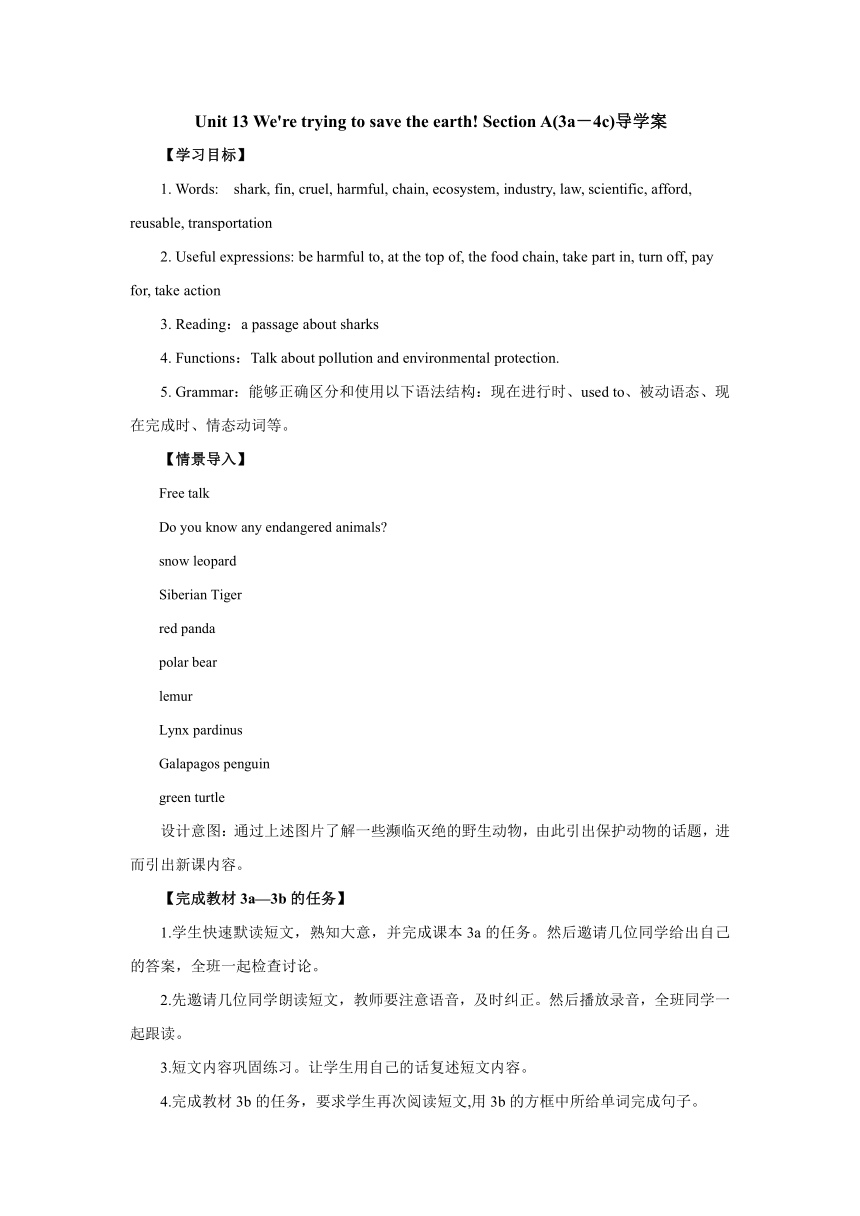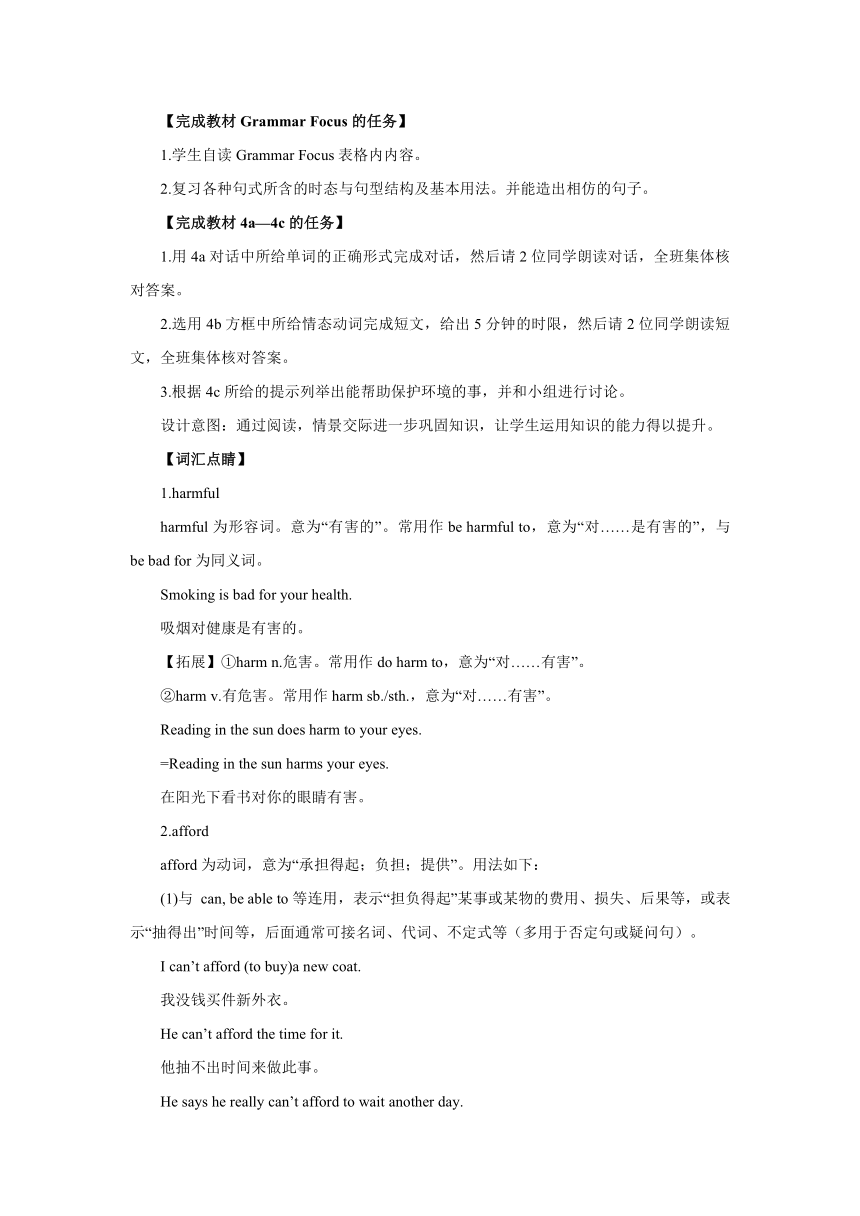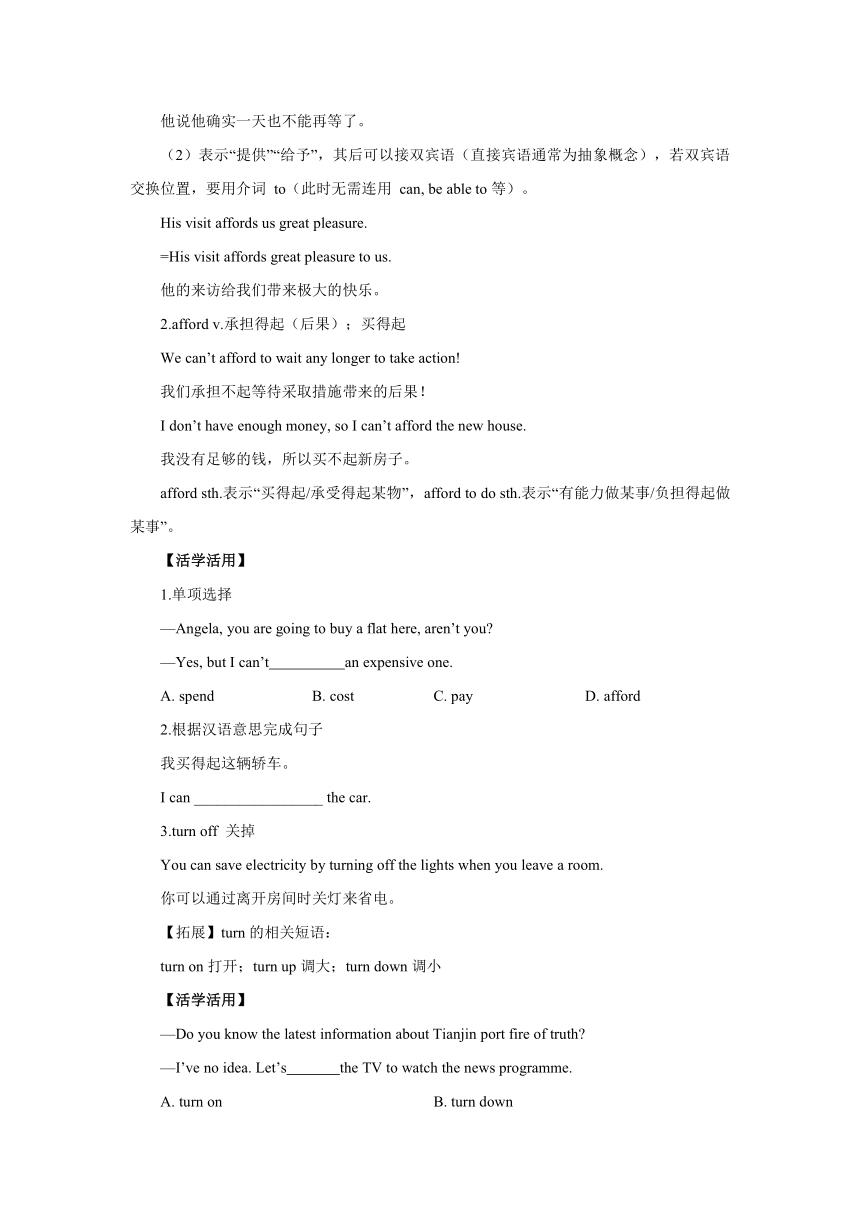人教版九年级英语全册 Unit 13 We're trying to save the earth! Section A(3a-4c)导学案
文档属性
| 名称 | 人教版九年级英语全册 Unit 13 We're trying to save the earth! Section A(3a-4c)导学案 |  | |
| 格式 | docx | ||
| 文件大小 | 126.9KB | ||
| 资源类型 | 教案 | ||
| 版本资源 | 人教新目标(Go for it)版 | ||
| 科目 | 英语 | ||
| 更新时间 | 2022-11-19 14:51:31 | ||
图片预览




文档简介
Unit 13 We're trying to save the earth! Section A(3a-4c)导学案
【学习目标】
1. Words: shark, fin, cruel, harmful, chain, ecosystem, industry, law, scientific, afford, reusable, transportation
2. Useful expressions: be harmful to, at the top of, the food chain, take part in, turn off, pay for, take action
3. Reading:a passage about sharks
4. Functions:Talk about pollution and environmental protection.
5. Grammar:能够正确区分和使用以下语法结构:现在进行时、used to、被动语态、现在完成时、情态动词等。
【情景导入】
Free talk
Do you know any endangered animals
snow leopard
Siberian Tiger
red panda
polar bear
lemur
Lynx pardinus
Galapagos penguin
green turtle
设计意图:通过上述图片了解一些濒临灭绝的野生动物,由此引出保护动物的话题,进而引出新课内容。
【完成教材3a—3b的任务】
1.学生快速默读短文,熟知大意,并完成课本3a的任务。然后邀请几位同学给出自己的答案,全班一起检查讨论。
2.先邀请几位同学朗读短文,教师要注意语音,及时纠正。然后播放录音,全班同学一起跟读。
3.短文内容巩固练习。让学生用自己的话复述短文内容。
4.完成教材3b的任务,要求学生再次阅读短文,用3b的方框中所给单词完成句子。
【完成教材Grammar Focus的任务】
1.学生自读Grammar Focus表格内内容。
2.复习各种句式所含的时态与句型结构及基本用法。并能造出相仿的句子。
【完成教材4a—4c的任务】
1.用4a对话中所给单词的正确形式完成对话,然后请2位同学朗读对话,全班集体核对答案。
2.选用4b方框中所给情态动词完成短文,给出5分钟的时限,然后请2位同学朗读短文,全班集体核对答案。
3.根据4c所给的提示列举出能帮助保护环境的事,并和小组进行讨论。
设计意图:通过阅读,情景交际进一步巩固知识,让学生运用知识的能力得以提升。
【词汇点睛】
1.harmful
harmful为形容词。意为“有害的”。常用作be harmful to,意为“对……是有害的”,与be bad for为同义词。
Smoking is bad for your health.
吸烟对健康是有害的。
【拓展】①harm n.危害。常用作do harm to,意为“对……有害”。
②harm v.有危害。常用作harm sb./sth.,意为“对……有害”。
Reading in the sun does harm to your eyes.
=Reading in the sun harms your eyes.
在阳光下看书对你的眼睛有害。
2.afford
afford为动词,意为“承担得起;负担;提供”。用法如下:
(1)与 can, be able to等连用,表示“担负得起”某事或某物的费用、损失、后果等,或表示“抽得出”时间等,后面通常可接名词、代词、不定式等(多用于否定句或疑问句)。
I can’t afford (to buy)a new coat.
我没钱买件新外衣。
He can’t afford the time for it.
他抽不出时间来做此事。
He says he really can’t afford to wait another day.
他说他确实一天也不能再等了。
(2)表示“提供”“给予”,其后可以接双宾语(直接宾语通常为抽象概念),若双宾语交换位置,要用介词 to(此时无需连用 can, be able to等)。
His visit affords us great pleasure.
=His visit affords great pleasure to us.
他的来访给我们带来极大的快乐。
2.afford v.承担得起(后果);买得起
We can’t afford to wait any longer to take action!
我们承担不起等待采取措施带来的后果!
I don’t have enough money, so I can’t afford the new house.
我没有足够的钱,所以买不起新房子。
afford sth.表示“买得起/承受得起某物”,afford to do sth.表示“有能力做某事/负担得起做某事”。
【活学活用】
1.单项选择
—Angela, you are going to buy a flat here, aren’t you
—Yes, but I can’t an expensive one.
A. spend B. cost C. pay D. afford
2.根据汉语意思完成句子
我买得起这辆轿车。
I can _________________ the car.
3.turn off 关掉
You can save electricity by turning off the lights when you leave a room.
你可以通过离开房间时关灯来省电。
【拓展】turn的相关短语:
turn on打开;turn up调大;turn down调小
【活学活用】
—Do you know the latest information about Tianjin port fire of truth
—I’ve no idea. Let’s the TV to watch the news programme.
A. turn on B. turn down
C. turn up D. turn off
4.be worried about
be worried about意为“担心”。相当于worry about意为“为…担心”,worried是形容词,意为“担忧的,焦虑的”。
The woman seems worried about something.
那位妇女好像担心什么事情。
【句型透视】
1. This method is not only cruel, but also harmful to the environment.
这种方法不仅残酷,而且对环境有害。
not only…but also…意为“不仅……而且……”,用于连接两个表示并列关系的成分,着重强调后者,其中的also有时可以省略。
She not only plays well, but also writes music.
她不仅很会演奏,而且还会作曲。
Not only men but also women were chosen.
不仅仅是男的,女的也有被选中的。
He works not only on weekdays but on Sundays as well.
他不仅平时工作,星期日也工作。
注意:①若连接两个成分作主语,其谓语通常与靠近的主语保持一致。
Not only you but also he has to leave.
不只是你,他也得离开。
②若连接两个句子,not only后面的句子要用倒装。
Not only did he speak more correctly, but he spoke more easily.
他不仅说得更正确,而且讲得更不费劲了。
2.If their numbers drop too low, it will bring danger to all ocean life.
如果它们的数量降至太低,会给所有海洋生物带来危险。
if引导的是条件状语从句,谓语动词使用一般现在时代替一般将来时,主句使用一般将来时。
If it doesn’t rain tomorrow, we will go fishing.
如果明天不下雨,我们就去钓鱼。
【活学活用】
(1)If farmers trees and forests, giant pandas nowhere to live.
A. cut down; have
B. will cut down; will have
C. will cut down; have
D. cut down; will have
(2)It will be hard for us to get up in the morning if we to bed too late.
A. go B. went C. will go D. have gone
3.So far, no scientific studies have shown that shark fins are good for health, so why eat them
到目前为止,没有科学研究显示鲨鱼鳍对健康有好处,所以为什么吃它们呢?
(1)so far意为“到目前为止”,主句时态使用现在完成时;句中that引导的是宾语从句,作动词shown的宾语。
(2)be good for…意为“对……有好处”。
【活学活用】
(1)—What do you think of the new foreign teacher Thomson
—Pretty good. I think he a great job so far.
A. does B. did
C. has done D. was done
(2)I think drinking milk is good our health.
A. for B.to C. with D. at
4.It’s difficult for parents with young children to use public transportation…
对于有小孩子的父母来说,使用公共交通工具很难……
本句为“It is+adj.+for/of sb.to do sth.”结构,其中it作形式主语,动词不定式作句子的真正主语。
【拓展】在句型“It’s+adj.+for/of sb. to do sth.”中,如果形容词描述的是事物,则用for;如果形容词指人的品质或特征,则用of。
It’s hard for us to finish the work on time.
对我们来说,按时完成这项工作是困难的。
It’s kind of you to help me.你帮助我真是太好了。
【活学活用】
1.单项选择
(1)It’s really you to drive so fast on such a rainy day. Slow down!
A. crazy for B. crazy of
C. wise for D. wise of
(2)It’s difficult him work out the problem.
A. for; to B. of; to
C. to; for D. to; of
2.根据汉语完成句子
(1)玩电脑游戏很有趣。
_____________________________________________.
(2)回答这个问题很容易。
_____________________________________________.
【语法摘要】
现在进行时
动词-ing形式的构成
一般情况下,在动词词尾后加-ing。go → going。
以不发音的e结尾的动词,去掉e加 -ing。 have → having。
以重读闭音节结尾的动词,末尾只有一个辅音字母,双写这个辅音字母,再加 -ing。 stop → stopping。
现在完成时
过去分词构成规则
一般情况下,在动词后加-ed。work → worked。
在以e结尾的动词后只加 -d。close → closed。
在以辅音字母加y结尾的动词,应将y改为i再加ed。study → studied。
以重读闭音节结尾的动词,要双写末尾的辅音字母再加-ed。stop → stopped。
不规则动词的过去分词:
AAA型 put put put
AAB型 beat beat beaten
ABA型 become became become
ABB型 get got got/gotten
ABC型 begin began begun
被动语态
主动语态和被动语态的区别
主动语态表示主语是动作的执行者。被动语态表示主语是动作的承受者,即行为动作的对象。
I cleaned my room. → My room was cleaned by me.
I saw him cross the road and enter the shop.
→ He was seen to cross the road and enter the shop.
在含有使役动词 (make, let等) 或感官动词 (see, watch, notice, hear等) 的主动语态的句子中,这些词后常跟省略to的动词不定式,但是改为被动语态时则要把省去的to还原。
被动语态的构成
被动语态的构成:be + 过去分词
一般现在时被动语态:am/is/are + 过去分词
一般过去时被动语态:was/ were + 过去分词
一般将来时被动语态:will be/ is going to be + 过去分词
情态动词的被动语态:can/could/may/might/should/must + be + 过去分词
情态动词
1. 情态动词通常无人称和数的变化。
2. 情态动词后接动词原形。
3. 情态动词有:can/could能够;may/might可能、可以;need需要;
have to不得不;would愿意、将要;shall将(第一人称);
should应该;must必须
used to
used to意为“过去常常做某事” ,后接动词原形。
used to句型的否定句形式:didn’t use to
used to句型的一般疑问句的形式:Did + 主语 + use to ...
used to do表示过去常常做某事,而现在往往不做了;
be used to doing表示习惯于做某事。
【学习目标】
1. Words: shark, fin, cruel, harmful, chain, ecosystem, industry, law, scientific, afford, reusable, transportation
2. Useful expressions: be harmful to, at the top of, the food chain, take part in, turn off, pay for, take action
3. Reading:a passage about sharks
4. Functions:Talk about pollution and environmental protection.
5. Grammar:能够正确区分和使用以下语法结构:现在进行时、used to、被动语态、现在完成时、情态动词等。
【情景导入】
Free talk
Do you know any endangered animals
snow leopard
Siberian Tiger
red panda
polar bear
lemur
Lynx pardinus
Galapagos penguin
green turtle
设计意图:通过上述图片了解一些濒临灭绝的野生动物,由此引出保护动物的话题,进而引出新课内容。
【完成教材3a—3b的任务】
1.学生快速默读短文,熟知大意,并完成课本3a的任务。然后邀请几位同学给出自己的答案,全班一起检查讨论。
2.先邀请几位同学朗读短文,教师要注意语音,及时纠正。然后播放录音,全班同学一起跟读。
3.短文内容巩固练习。让学生用自己的话复述短文内容。
4.完成教材3b的任务,要求学生再次阅读短文,用3b的方框中所给单词完成句子。
【完成教材Grammar Focus的任务】
1.学生自读Grammar Focus表格内内容。
2.复习各种句式所含的时态与句型结构及基本用法。并能造出相仿的句子。
【完成教材4a—4c的任务】
1.用4a对话中所给单词的正确形式完成对话,然后请2位同学朗读对话,全班集体核对答案。
2.选用4b方框中所给情态动词完成短文,给出5分钟的时限,然后请2位同学朗读短文,全班集体核对答案。
3.根据4c所给的提示列举出能帮助保护环境的事,并和小组进行讨论。
设计意图:通过阅读,情景交际进一步巩固知识,让学生运用知识的能力得以提升。
【词汇点睛】
1.harmful
harmful为形容词。意为“有害的”。常用作be harmful to,意为“对……是有害的”,与be bad for为同义词。
Smoking is bad for your health.
吸烟对健康是有害的。
【拓展】①harm n.危害。常用作do harm to,意为“对……有害”。
②harm v.有危害。常用作harm sb./sth.,意为“对……有害”。
Reading in the sun does harm to your eyes.
=Reading in the sun harms your eyes.
在阳光下看书对你的眼睛有害。
2.afford
afford为动词,意为“承担得起;负担;提供”。用法如下:
(1)与 can, be able to等连用,表示“担负得起”某事或某物的费用、损失、后果等,或表示“抽得出”时间等,后面通常可接名词、代词、不定式等(多用于否定句或疑问句)。
I can’t afford (to buy)a new coat.
我没钱买件新外衣。
He can’t afford the time for it.
他抽不出时间来做此事。
He says he really can’t afford to wait another day.
他说他确实一天也不能再等了。
(2)表示“提供”“给予”,其后可以接双宾语(直接宾语通常为抽象概念),若双宾语交换位置,要用介词 to(此时无需连用 can, be able to等)。
His visit affords us great pleasure.
=His visit affords great pleasure to us.
他的来访给我们带来极大的快乐。
2.afford v.承担得起(后果);买得起
We can’t afford to wait any longer to take action!
我们承担不起等待采取措施带来的后果!
I don’t have enough money, so I can’t afford the new house.
我没有足够的钱,所以买不起新房子。
afford sth.表示“买得起/承受得起某物”,afford to do sth.表示“有能力做某事/负担得起做某事”。
【活学活用】
1.单项选择
—Angela, you are going to buy a flat here, aren’t you
—Yes, but I can’t an expensive one.
A. spend B. cost C. pay D. afford
2.根据汉语意思完成句子
我买得起这辆轿车。
I can _________________ the car.
3.turn off 关掉
You can save electricity by turning off the lights when you leave a room.
你可以通过离开房间时关灯来省电。
【拓展】turn的相关短语:
turn on打开;turn up调大;turn down调小
【活学活用】
—Do you know the latest information about Tianjin port fire of truth
—I’ve no idea. Let’s the TV to watch the news programme.
A. turn on B. turn down
C. turn up D. turn off
4.be worried about
be worried about意为“担心”。相当于worry about意为“为…担心”,worried是形容词,意为“担忧的,焦虑的”。
The woman seems worried about something.
那位妇女好像担心什么事情。
【句型透视】
1. This method is not only cruel, but also harmful to the environment.
这种方法不仅残酷,而且对环境有害。
not only…but also…意为“不仅……而且……”,用于连接两个表示并列关系的成分,着重强调后者,其中的also有时可以省略。
She not only plays well, but also writes music.
她不仅很会演奏,而且还会作曲。
Not only men but also women were chosen.
不仅仅是男的,女的也有被选中的。
He works not only on weekdays but on Sundays as well.
他不仅平时工作,星期日也工作。
注意:①若连接两个成分作主语,其谓语通常与靠近的主语保持一致。
Not only you but also he has to leave.
不只是你,他也得离开。
②若连接两个句子,not only后面的句子要用倒装。
Not only did he speak more correctly, but he spoke more easily.
他不仅说得更正确,而且讲得更不费劲了。
2.If their numbers drop too low, it will bring danger to all ocean life.
如果它们的数量降至太低,会给所有海洋生物带来危险。
if引导的是条件状语从句,谓语动词使用一般现在时代替一般将来时,主句使用一般将来时。
If it doesn’t rain tomorrow, we will go fishing.
如果明天不下雨,我们就去钓鱼。
【活学活用】
(1)If farmers trees and forests, giant pandas nowhere to live.
A. cut down; have
B. will cut down; will have
C. will cut down; have
D. cut down; will have
(2)It will be hard for us to get up in the morning if we to bed too late.
A. go B. went C. will go D. have gone
3.So far, no scientific studies have shown that shark fins are good for health, so why eat them
到目前为止,没有科学研究显示鲨鱼鳍对健康有好处,所以为什么吃它们呢?
(1)so far意为“到目前为止”,主句时态使用现在完成时;句中that引导的是宾语从句,作动词shown的宾语。
(2)be good for…意为“对……有好处”。
【活学活用】
(1)—What do you think of the new foreign teacher Thomson
—Pretty good. I think he a great job so far.
A. does B. did
C. has done D. was done
(2)I think drinking milk is good our health.
A. for B.to C. with D. at
4.It’s difficult for parents with young children to use public transportation…
对于有小孩子的父母来说,使用公共交通工具很难……
本句为“It is+adj.+for/of sb.to do sth.”结构,其中it作形式主语,动词不定式作句子的真正主语。
【拓展】在句型“It’s+adj.+for/of sb. to do sth.”中,如果形容词描述的是事物,则用for;如果形容词指人的品质或特征,则用of。
It’s hard for us to finish the work on time.
对我们来说,按时完成这项工作是困难的。
It’s kind of you to help me.你帮助我真是太好了。
【活学活用】
1.单项选择
(1)It’s really you to drive so fast on such a rainy day. Slow down!
A. crazy for B. crazy of
C. wise for D. wise of
(2)It’s difficult him work out the problem.
A. for; to B. of; to
C. to; for D. to; of
2.根据汉语完成句子
(1)玩电脑游戏很有趣。
_____________________________________________.
(2)回答这个问题很容易。
_____________________________________________.
【语法摘要】
现在进行时
动词-ing形式的构成
一般情况下,在动词词尾后加-ing。go → going。
以不发音的e结尾的动词,去掉e加 -ing。 have → having。
以重读闭音节结尾的动词,末尾只有一个辅音字母,双写这个辅音字母,再加 -ing。 stop → stopping。
现在完成时
过去分词构成规则
一般情况下,在动词后加-ed。work → worked。
在以e结尾的动词后只加 -d。close → closed。
在以辅音字母加y结尾的动词,应将y改为i再加ed。study → studied。
以重读闭音节结尾的动词,要双写末尾的辅音字母再加-ed。stop → stopped。
不规则动词的过去分词:
AAA型 put put put
AAB型 beat beat beaten
ABA型 become became become
ABB型 get got got/gotten
ABC型 begin began begun
被动语态
主动语态和被动语态的区别
主动语态表示主语是动作的执行者。被动语态表示主语是动作的承受者,即行为动作的对象。
I cleaned my room. → My room was cleaned by me.
I saw him cross the road and enter the shop.
→ He was seen to cross the road and enter the shop.
在含有使役动词 (make, let等) 或感官动词 (see, watch, notice, hear等) 的主动语态的句子中,这些词后常跟省略to的动词不定式,但是改为被动语态时则要把省去的to还原。
被动语态的构成
被动语态的构成:be + 过去分词
一般现在时被动语态:am/is/are + 过去分词
一般过去时被动语态:was/ were + 过去分词
一般将来时被动语态:will be/ is going to be + 过去分词
情态动词的被动语态:can/could/may/might/should/must + be + 过去分词
情态动词
1. 情态动词通常无人称和数的变化。
2. 情态动词后接动词原形。
3. 情态动词有:can/could能够;may/might可能、可以;need需要;
have to不得不;would愿意、将要;shall将(第一人称);
should应该;must必须
used to
used to意为“过去常常做某事” ,后接动词原形。
used to句型的否定句形式:didn’t use to
used to句型的一般疑问句的形式:Did + 主语 + use to ...
used to do表示过去常常做某事,而现在往往不做了;
be used to doing表示习惯于做某事。
同课章节目录
- Unit 1 How can we become good learners.
- Section A
- Section B
- Unit 2 I think that mooncakes are delicious!
- Section A
- Section B
- Unit 3 Could you please tell me where the restroom
- Section A
- Section B
- Unit 4 I used to be afraid of the dark.
- Section A
- Section B
- Unit 5 What are the shirts made of?
- Section A
- Section B
- Review of Units 1-5
- Unit 6 When was it invented?
- Section A
- Section B
- Unit 7 Teenagers should be allowed to choose their
- Section A
- Section B
- Unit 8 It must belong to Carla.
- Section A
- Section B
- Unit 9 I like music that I can dance to.
- Section A
- Section B
- Unit 10 You're supposed to shake hands.
- Section A
- Section B
- Review of Units 6-10
- Unit 11 Sad movies make me cry.
- Section A
- Section B
- Unit 12 Life is full of the unexpected
- Section A
- Section B
- Unit 13 We're trying to save the earth!
- Section A
- Section B
- Unit 14 I remember meeting all of you in Grade 7.
- Section A
- Section B
- Review of Units 11-14
